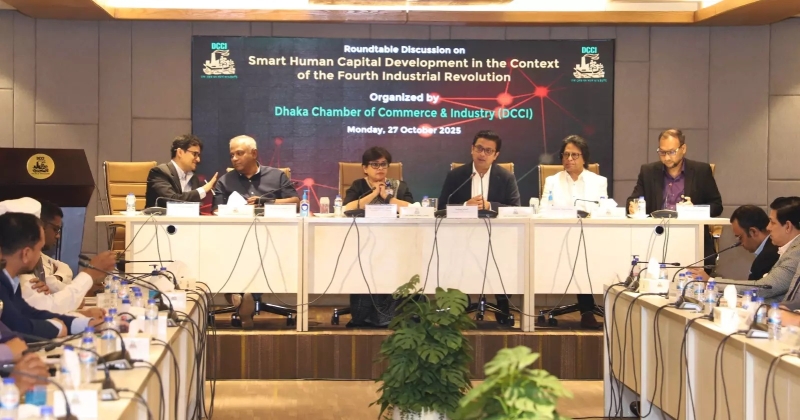- Tarique vows quick execution of Teesta Master Plan if elected |
- How Undecided voters May Decide the Election |
- Nearly one million security personnel to guard BD elections |
- Restoring trust in Allah, Caretaker Govt; good governance, employment, no-revenge BNP's key election pledges |
AI reshaping our industrial, service sectors: DCCI President

DCCI President Taskeen Ahmed speaking at a roundtable titled Smart Human Capital Development in the Context of the Fourth Industrial Revolution (4IR) at the DCCI Auditorium on Monday._11zon
Dhaka Chamber of Commerce and Industry (DCCI) President Taskeen Ahmed on Monday said artificial intelligence (AI) is reshaping Bangladesh’s industrial and service sectors, making it imperative to develop smart and skilled human resources to remain competitive in the era of the Fourth Industrial Revolution (4IR).
He made the remarks while speaking at a roundtable titled ‘Smart Human Capital Development in the Context of the Fourth Industrial Revolution (4IR)’ held at the DCCI Auditorium.
Executive Chairman of the National Skills Development Authority (NSDA) Dr Nazneen Kawshar Chowdhury attended the event as the chief guest.
Taskeen said the Fourth Industrial Revolution is not merely a technological shift but a fundamental transformation of production systems, business operations and labour markets.
Citing a World Economic Forum report, he noted that nearly one-fourth of existing jobs will be transformed within the next five years.
“In the post-LDC era, smart human resources will be a key instrument to sustain competitiveness,” he said, stressing the need for fundamental reforms in the education system, greater emphasis on technical education, and stronger industry-academia collaboration.
Dr Nazneen Kawshar highlighted the lack of coordination among government agencies and limited awareness about skills development as major challenges. She said that after establishing its institutional structure, the NSDA is now focusing on human resource training, including initiatives to send 100,000 skilled workers to Japan through language and technical training programmes.
She also called for integrating skill development with 4IR needs, enhancing public-private partnerships, and promoting upskilling opportunities for women workers.
Presenting the keynote paper, Dr M Niaz Asadullah, Visiting Professor of Economics at the University of Reading, UK, referred to a 2019 a2i-UNDP study projecting the potential loss of around 5.38 million jobs in Bangladesh’s RMG, food, agriculture, furniture, tourism and hospitality sectors by 2030 due to technological advancements.
He urged greater investment in workforce training and modernization of the education system to prepare workers for AI-driven transformations.
ICMAB President Mahtab Uddin Ahmed said that only 20 percent of graduates secure jobs matching their qualifications, underscoring the need to promote technical and vocational education and change social perceptions regarding skill-based careers.
DCCI Senior Vice President Razeev H Chowdhury, Vice President Md Salem Sulaiman, directors and other stakeholders were also present at the discussion. - UNB

